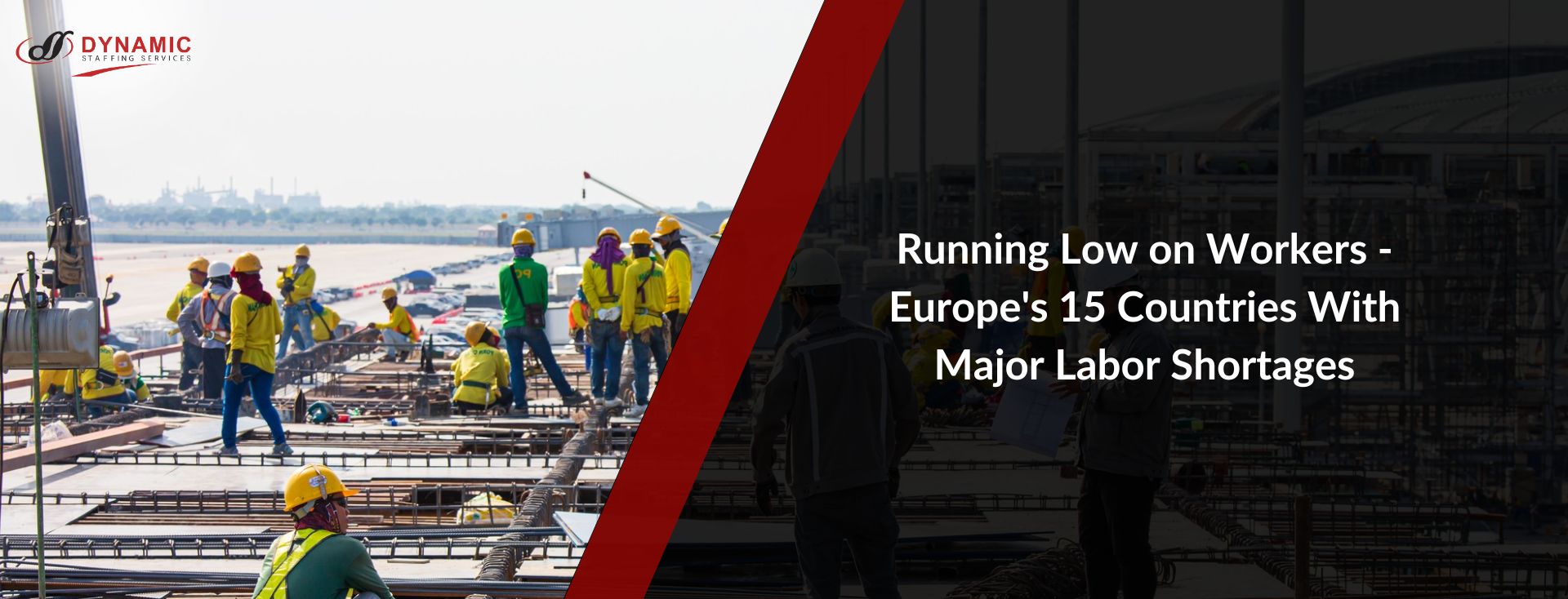This article examines the top 15 European nations with severe labor shortages and covers the larger occupational difficulties in Europe. The labor market in the European Union remained remarkably resilient in 2022, even in the face of many problems, such as economic downturn and geopolitical concerns.
The employment rate peaked at 74.6%, and employment surged to a record high of 213.7 million. Meanwhile, young unemployment plummeted to 14.5%, and unemployment rates fell to a record low of 6.2%. Check out the list of nations with the lowest unemployment rates to learn more about rates.
But there is still a labor shortage in Europe at all skill levels, which significantly impacts industries like STEM, healthcare, and construction. The working-age population is predicted to decrease even more, from 272 million in 2009 to 265 million in 2022, and 258 million by 2030.
The aging population is one of the factors contributing to this shortage. See countries with the highest labor shortages in the world to learn more about labor shortages around the globe.
Using the latest Report on Talent Shortages for 2024, we were able to determine the( prop ?)skilled labor shortages by the country, for the countries in Europe that will be most affected. To break ties across countries with comparable percentages of skilled labor shortage, we used World Bank data on the aging population in each nation. These are the top European nations where there is a severe labor shortage:
- Germany: As Europe’s largest economy, Germany faces significant manufacturing, hospitality, and healthcare shortages. Problems are made worse by an aging population and a declining birth rate.
- United Kingdom: Post-Brexit immigration rules have tightened the labor market, particularly in agriculture, healthcare, and construction. The UK is also grappling with skill mismatches and an aging workforce.
- France: The “yellow vests” movement highlighted the social tensions exacerbated by labor shortages, especially in the hospitality and manufacturing sectors.
- Spain: Despite its high unemployment rate, Spain experiences shortages due to skill mismatches and an aging population.
- Italy: An aging population and brain drain to other EU countries have led to shortages in healthcare, engineering, and technology.
- Poland: With one of the fastest-growing economies in the EU, Poland faces shortages in manufacturing and construction, partly due to emigration to other EU countries.
- Netherlands: The Dutch healthcare and education sectors are particularly hard-hit by labor shortages.
- Belgium: Belgium’s labor shortages are pronounced in the engineering and IT sectors, compounded by an aging workforce.
- Sweden: The Swedish economy is hampered by shortages in healthcare and technology sectors despite its reputation for high living standards and a strong welfare system.
- Norway: Norway’s oil and gas industry, along with healthcare and construction, lacks skilled labor despite attractive working conditions.
- Finland: The Finnish hospitality and healthcare sectors are in dire need of skilled workers, and the country is looking to immigration to bolster its workforce.
- Austria: With a booming economy, Austria faces labor shortages in skilled trades.
- Czech Republic: Labor shortages particularly affect the Czech Republic’s IT and hospitality sectors, impacting the country’s industrial output.
- Denmark: The construction, technology, and healthcare industries in Denmark have difficulty finding enough qualified personnel to meet demand.
- Ireland: The “Celtic Tiger” economy is roaring back, but sectors like construction and healthcare need more skilled workers to sustain growth.
Additional read: How can Britain overcome the skilled worker shortage post-Brexit?
Underlying Causes
Labor shortages occur when there are more job vacancies than available workers to fill them. This can happen in various sectors, from healthcare and construction to information technology and hospitality. The labor shortages in these countries can be attributed to several key factors:
- Aging Population: Many European countries have aging populations, resulting in a shrinking workforce.
- Skill Mismatches: There is often a mismatch between workers’ skills and employers’ needs, particularly in fast-evolving sectors like hospitality and construction.
- Migration Patterns: While migration has helped mitigate shortages in some areas, restrictions and Brexit have complicated these flows in others.
- Educational System Limitations: In some cases, the educational system is not aligned with the market’s needs, leading to a gap in vocational and technical skills.
Wrapping Up
Labor shortages in these 15 European countries highlight a complex challenge that requires strategic, innovative solutions. By addressing the root causes and implementing forward-thinking policies, Europe can not only overcome these shortages but also pave the way for a more dynamic, resilient economy. Collaboration between governments, industries, and educational institutions is crucial to adapting to the evolving labor market and ensuring sustainable growth and prosperity.
Concluding our discussion, it is clear that Europe’s skill shortage presents a significant challenge but also a unique opportunity for both the continent and skilled laborers from India. As Europe seeks solutions to fill the gaps in its workforce, the demand for specialized skills from regions with a surplus of talent, like India, is on the rise. This not only benefits European economies by addressing their immediate needs but also offers Indian professionals a chance to expand their horizons, gain international experience, and contribute to global markets.
At Dynamic Staffing Services, we stand at the forefront of bridging this gap. With our deep understanding of the European job market and a robust network across various industries, we are perfectly positioned to facilitate the seamless transition of India’s skilled labor force into these high-demand roles. Our tailored recruitment solutions ensure that both employers and employees benefit from an optimal match, fostering growth, innovation, and cross-cultural collaboration.
When companies in Europe collaborate with us, they get access to a large pool of skilled individuals who can offer new insights and experience to your initiatives. For Indian job seekers, it signifies a world of new opportunities, promising not just professional growth but also the chance to experience diverse cultures and work environments.
In conclusion, as Europe looks towards India for skilled labor to combat its skill shortage, we are here to make those connections easier, faster, and more effective. Let’s work together to create win-win situations for European businesses and Indian professionals alike, paving the way for a future of shared success and prosperity. For more details, contact us today at +91-11-40410000 or email enquiry@dss-hr.com.
Visit our Website: Dynamic Staffing Services.





